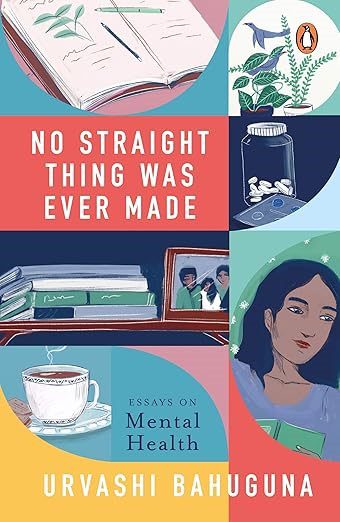
Reviewer: Kritika Narula
(Instagram/Threads: @kritika.narula;
Twitter/ X: @KritikaTweeting)
Title: No Straight Thing Was Ever Made: Essays on Mental Health
Author: Urvashi Bahuguna
Genre: Non-Fiction/Essays
Language: English
Year: 2021
Publisher: Penguin, India.
Pages: 200 (Hardcover)
Price: INR 403/- (Amazon)
ISBN: 978-0670091591
“Whether ill people want to tell stories or not, illness calls for stories.”
In most accounts of mental illness, the narrator succumbs to the temptation of explaining melancholy through metaphors.
Winston Churchill called it the Black Dog.
Sylvia Plath refers to it as The Bell Jar.
Emily Dickinson alluded to the Heavenly Hurt.
This flair for the dramatic is a luxury a brown person dealing with mental illness cannot indulge in. (We have since found that most metaphors are a slippery slope, like the seemingly racist connotations of the ‘Black Dog’). The state of sickness comes with a need for tact and nuance.
Dramatisation may not be the fastest path to recovery.
The best chance we have at deciphering mental illness, and untangling from its clutches, is by sharing our lived experience raw. Urvashi Bahuguna understands this and serves her experience in measured, thoughtful words. For her collection of essays on mental health, she borrows words from Immanuel Kant,
“Out of the crooked timber of humanity, no straight thing was ever made.”
It’s a befitting title for a collection of ten thematic essays, where Bahuguna describes the upheaval her mental illness unleashed on her life, relationships, friendships, ambitions, career, plans, the spillovers, and her adjustment to the new reality. The essays are authentic accounts of her reckoning with depression, and recovery, too, is an ordeal, as she alternates between epiphanies and fogs.
The recollections are meant to be honest, not palatable. And even though she refrains from directly ascribing the hardships to more extensive systemic or societal machinations, there’s certain universality in the experiences of the sick minds. It struck a chord with me right in the preface when she mentioned, “I did not know what invisible illness was before I fell ill in ways that were unfamiliar and opaque to me” about the onset.
My thesis on the universality of her experiences begins here. Perhaps all of us, in the early days of discovering our new lives, are silently oscillating between letting the mental illness consume us and putting up a fight to prevent encroachment.
Like her, I was familiarizing myself with this new beast at first. I was resisting it, resenting it, and reprimanding it. It was only much later that I started my healing, wherein, as she describes, “accepting symptoms as an outcome of the illness rather than a personal shortcoming” was a crucial first step, yet a steep slope to climb.
In Bahuguna’s writing, there’s no glossing over the collateral damages of the maladies of the mind. Family, friends, romantic partners are all under scrutiny, investigated for the role they may have played as perpetrators of the illness as well as for their competence as a caregiver in the face of a diagnosis. Bahuguna writes,
“Being ill is lonely. Nothing is lonelier than the first year(s) of trying to explain your illness to people close to you.”
Somewhere along the process, it strikes you that the world is not fully apprised of the illness, so now the burden of explaining how the illness works — in real time as you discover its workings — falls on you. This reinforces the idea that you are alone in this. How does one not fall further into the abyss?
As she offers more information about her illness, she supports her thoughts with those from other poets, researchers, and writers – evidence that she didn’t go through a singular experience. In the end, the burden of reconciling with the inadequacy of people who were supposed to be her support system falls squarely on her, too. There’s not a lot we can change about the world, not least while we’re in the clutches of depression.
***
If I had to pick one essay from this collection that encompasses the personal yet universal flavour of her experiences, it would be “Everything For This Beauty.” She dives into the vicious loop of how her mental health (deteriorating) affects her physical wellbeing (also deteriorating) and how they present a circular problem. Her highly personal anecdotes serve as a template for the underlying systemic issues making us sicker.
When she says, “you have to accept fatigue or reduced operational capacity and forgive the body”, she is only relaying her experience (and lesson), but there’s a silent nod to the more significant problem: when your sickness is invisible, how are you to justify your sub-par productivity to this efficiency-crazed world?
I am reminded of Jiddu Krishnamurti’s words that I often seek refuge in, “It is no measure of health to be well adjusted to a profoundly sick society.” But there’s one more string connecting her physical and mental health, only making things worse.
She writes:
“The doctor and I often get into disagreements, because he wants to prescribe the medicine that is best for me, but I want the one that won’t make me fat. Because the thinner I am and the less convex the stomach, the fewer anxieties I hold.”
You see, she isn’t wrong. In what world is it fair that the cure exacerbates the pain? She exposes her weakest moments. Like how she editorialises the presentation of her public persona through the body of her old self, a body she deemed acceptable. How when she is uncomfortable with conversations about beauty, she tries to theorise her suffering: discomfort, she writes, is an intellectual position.
Her feminist body (and mind) should understand this. But the body is not playing on her team.
“What are the notions of female fragility and preoccupations with appearance women are supposed to resist? Somebody please remind the body. Anxieties about appearance are held over tripwires that connect patriarchy and feminism, and somehow the body is falling short of the standards of both.”
“She doesn’t want to be feminist as badly as she wants to be told she is thin.”
This last sentence will haunt me for a long time to come. It’s cruelly hilarious how the mind prioritises what it will obsess over. Not only is her obsession over her thinness unproductive, she’s now berating herself as a failed feminist. Years of learning and unlearning to become a feminist, but one pull on the string and it unspools, in a cycle of perceived helplessness at a time when factual helplessness hasn’t been conquered.
“She is angry that thinness is not the answer to a prayer, not a mercy for the obsessed.”
***
In the exposition of her recovery, too, she is eloquently candid about the ups and downs.
Recovery requires a brand of discipline, consistency and doggedness that may not make for a great story. On television, I’ve seen this admittance only once. The Netflix show featuring anthropomorphic animals, Bojack Horseman, showed its eponymous protagonist’s foray into healing. The motivational words from Jogging Baboon, “It gets easier. Every day it gets a little easier. But you gotta do it every day —that’s the hard part. But it does get easier” as he stood towering over Bojack on a sunny day, became a sacrosanct moment in the show.
That Bahuguna is laying bare the doubts and pitfalls of the therapy experience sets her essay apart from the many memoirs about therapy.
From batting suspicions from loved ones that she’s “paying someone to be your friend” to breaking up with a therapist because, sometimes, you say too much in the room and your therapist — also a human — is using everything you tell her as information about you, Bahuguna explores the painful parts of therapy very matter-of-factly.
“But my therapist was not a friend; she was the other side of the chessboard. She outmanoeuvred the compelling and twisted pathways of my mind — unknotting the confusion I was mired in to reach a clearing over and over again.”
Having left a therapist previously because I strongly felt (and later joked) that “we’d lost the plot,” I felt very seen in her confessional anecdote of needing a pivot in the therapeutic narrative.
Here’s how it happened: she shared a story about her family with her therapist, who wanted to explore that moment further, analyse it, slice it, pulverise it. Sometimes, a therapist will overestimate the meaning of a particular event in your life, and at other times, she may be holding a mirror for you to see how the event really impacted you. Since both the gestures look the same, your reaction and readiness decide if this analysis will be pursued. Bahuguna explains her response
“After I told her, I wanted to obliterate the memory, to never have told her. If I could not make her forget, I wanted her to perform the same time-warping and pain-blunting exercise I have performed a million times.”
She moved on to another therapist not too long after that. And the next page unlocked the most beautiful description of therapy (with her new therapist) I’ve ever read:
“This process became a way to map and understand myself, not just inside my mind, but on paper, with an audience and a record — with someone who was neither a loved one nor an enemy, someone trained in the architecture of the mind.”
***
Why do we read literature on mental illness? Why, a well-meaning friend once asked me, do you make yourself go through it all again? Isn’t your experience agonizing enough?
I read to know I am not alone. Just like any other experience in life that feels so singular — or thought that feels original — there’s someone who came before us who has felt and articulated it. We are standing on the shoulders of giants, as they say. These may be depressive giants, but they were remarkably accurate in their descriptors. “Is there no way out of the mind?” in 1962, Sylvia Plath wrote words that would resonate in many depression stories for many years to come.
Despite all the essays have to offer, I must admit that these dispatches about a mind in disarray, finding its way back into clarity, can feel overwhelming. To that effect, Bahuguna’s masterpiece is well-segmented into thematic essays to offer a modicum of predictability in the content I’m about to read. Small mercies. It also leaves room for hope:
“In my journey, the mastery of my illness wasn’t mastery over symptoms so much as one over misguided expectations.”
In this panoptic collection of essays, Bahuguna writes about her illness – and the reach of its tentacles — with honesty, and the product is a clever subversion of the long-standing idea of an “enemy” of mental health.
“There are no villains in this story, there is no decisive version of this story,” she writes.
Everyone’s complicit, yet no one is culpable.
Please purchase the book here.
Kritika Narula is a writer, journalist, and content marketer from Delhi, India. Her writing has appeared in The Hooghly Review, Lobster Salad, Champagne Magazine, The Auvert Magazine, Sanity by Tanmoy, among others. She judges a city by its bookstores. You can find her @KritikaTweeting on Twitter/X or kritika.narula on Instagram/threads.

Subscribe to our newsletter To Recieve Updates
Join our newsletter to receive updates